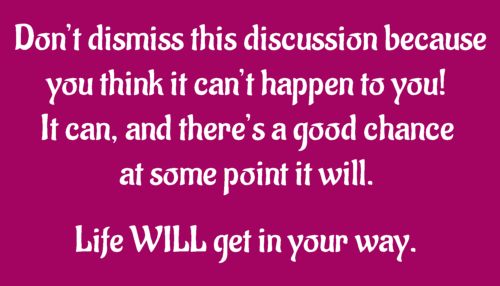Sometimes life just sucks.
At least that’s my conclusion after hearing recently from too many friends who are suffering various horrible things – health related, money related, death related, job related. And that’s just the friends who have shared their sucky situations.
Some of those friends are patient advocates, and among them are some very difficult health situations – cancer, a brain tumor, a stroke, a car accident… sometimes affecting themselves, other times affecting a loved one – a spouse, a child, a parent. I’m stunned, floored, worried, and my biggest frustration is that there is not a darned thing I can do to help any of them except to think good thoughts for them.
But then I get thinking more about their situations and I wonder…. are they prepared for what lies in front of them? I can almost guarantee they are not, and that they never even considered they would reach a point when they were not at the tops of their games, able to help clients and keep their practices growing. None of us ever expects to be faced with such debilitating hurdles; therefore we are rarely prepared to handle the consequences.
What are we supposed to do when life gets in the way?
I’ve been there. In 2004 I had a thriving marketing business, a panel of almost 100 clients. Then I was diagnosed with terminal cancer.
At first, like everyone else, I was just stunned, frozen, totally unable to process the news of my diagnosis. As I was called upon to make life changing / saving personal decisions, I disregarded my clients for almost two weeks, cancelling meetings, not returning phone calls or emails. I couldn’t cope with my own situation much less help someone else. It was impossible.
And I was healthy! (If you don’t understand how this could be, find more information here.) So I have to ask – if I, as a physically healthy person (despite my emotional devastation at the time) couldn’t cope – how can someone else cope, someone who is truly sick or upset about a loved one?
Of course, my work was marketing. Marketing is no emergency! Nobody is getting sicker. It’s not life and death. This post is about patient advocates whose work is all about other people and their personal health situations. FAR more important, with no option to just blow off work while one copes with his/her own situation.
Looking back, I can see some of the things I did right, some not very well, some that were simply default, totally unintentional. That’s no way to run a railroad!
That word “intentional” – it’s important – so this post is intended to help you, the advocacy professional, prepare for the day you, too, will run into practice-impacting situations.
When the Time Comes – When Life DOES Get in the Way
We must be prepared to do two things:
- Take care of ourselves so we can get back on our feet and back to business, and
- Take care of our businesses to be sure our clients are well-served for the duration, until we are ready to work with them again.
Disclaimer: I don’t have all the answers! But I do know many of the questions – so as well as I can, I’ll help you prepare.
Taking care of yourself:
- Take time to process your new reality, and prepare others for your absence. Those two weeks that I dropped out were not handled well. It would have been far wiser for me to send a blast email to all my clients (blind-copied, of course) that would have told them an emergency had cropped up and I would be unavailable for at least the next couple of weeks. Even if that was a guess at the time, it would have at least put them on notice that I was not going to reply to them or call them back. I would have been managing their expectations.One question I wrestled with: should I tell my clients I had been diagnosed? I decided that for me, the answer was NO – with no hesitation. In fact, I told almost no one until my ordeal was over. Why? Well – I’ll ask you – would you hire a marketing consultant who was either going to spend the next six months in chemo, or was going to die in a few months?
That is one of the questions we need to answer individually, based on our own life-gets-in-the-way circumstances. But be sure you aren’t creating bigger problems for yourself or your clients by sharing too much. Err on the side of less specific information, not more. A non-specific “emergency” may be all that’s required.
- Take care of yourself first. If you are the one who is sick, then you need to look out for Numero Uno. If your loved one is the suffering party, then you still need to look out for Numero Uno because if you can’t take good care of yourself, you can’t take care of anyone else.
- Hire a patient advocate if the situation warrants. Ask yourself – should someone else, a potential client with your current set of health circumstances hire you? If the answer is yes, then that’s what you need to do, too. The old adage for lawyers goes something like: “He who represents himself in court has a fool for a client.” What we as advocates know is that when a client is sick, he is totally unable to process information the way he would if he was healthy. He knows that, too – that’s one reason he hires us. Are we as smart as our clients? Do we recognize when we can’t do it ourselves? Dare we “represent ourselves” when we know it’s not really possible? Of course not.

Hire another advocate to help you or your loved one. Figure out who you would want that to be today – while you are healthy enough to make wise choices.
Taking care of your business:
- Don’t try to juggle too much. If your situation demands a good deal of your attention, then even if you think you have the wherewithall to keep working with your clients, you may not. Divided attention, a few unreturned calls, missing an appointment or deadline – these are all potential trust and deal breakers. Be realistic and manage your clients’ expectations.
- Find backup for your clients – today – while you are still healthy enough and have the time to do so. If you have a business partner, then you’re probably all set. Otherwise find someone local who will agree to work with your clients if you are unable to do so – and vice versa. You might even draw up a contract making that a formal arrangement. (APHA Premium members, you can use the subcontractor template found linked from the Legal Center as a template.)
- Be sure someone else can get into your files and business information. That someone else needs to be someone you trust – perhaps a spouse or adult child – someone you would never question about being good shepherds of the information. (This is one of the reasons I wonder about these computer and device log-ins that are based on scanning your iris or your fingerprint. What happens if an emergency calls for someone else to access your files?)

Write out instructions for them. Make a list of people they need to contact, along with the contact information they will need to do it. Compose a draft of an email that’s generic enough to alert clients, vendors and others, but will serve to manage their expectations. Make sure you keep a list of passwords they can access (not on your computer – in a file drawer somewhere.) Put everything but those passwords into a folder on your computer they can easily find, and show them where to find it when the time comes.I have two loved ones who can get into my business files if they need to, both on my computer and in a file drawer. If something would happen to me, they would be able to pick up on APHA where I left off. To me that’s better insurance than business insurance – at least for APHA members. And it gives me a great deal of peace of mind even today.
- Make sure your client contract covers interruptions in your work. If you are unable to perform your advocacy services for some period of time, what will become of your client relationship? What should they expect from you? Can their medical situation be shelved while you or your loved one recovers? Will you need to give them their money back? What determines the line between serving them in a timely fashion, and not being able to carry through on your promised responsibilities? Can someone else step in to help? (See “backup” above.) It would be smart to have this conversation with your lawyer, and build appropriate decisions into your contract.
- Communicate, communicate, communicate. Keep important people – clients, vendors, others to whom you’ve made promises – updated on your availability. Again – don’t give them more information than they need, but be sure they know when they will hear from you next, and/or what to expect in terms of arrangements you’ve made for someone else to work with them, or whatever the relationship requires.
- Put aside enough money to pay your bills for a few months so that if you can’t get paid for your work, you won’t go under because you were sick or hurt or caregiving.
There may be a dozen other steps you can take to prepare for a day when you need to take care of yourself, conduct business as usual, but can’t due to illness, injury, death or some other reason. If you know of others I hope you will share them below! Be prepared by formulating contingencies so that when your routine is on the fritz, you won’t lose your business as a result.

Please don’t dismiss this discussion because you think it can’t happen to you! It can, and there’s a good chance at some point it will. Life WILL get in your way.
The life and the business you save may be your own.
LEARN ABOUT APHA MEMBERSHIP | FIND MORE REASONS PATIENTS NEED ADVOCATES





So true, Trisha. As my mom used to say, “Man plans and G-d laughs!” For these times it is important for us all (not just our clients) to have added protection like Long Term Care Insurance and a supplemental such as AFLAC or the like.
Great quote, Prissi.
And a great suggestion. If your family is dependent on your advocacy income, then having disability insurance is a must.
Thanks for adding it to the list 🙂